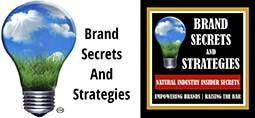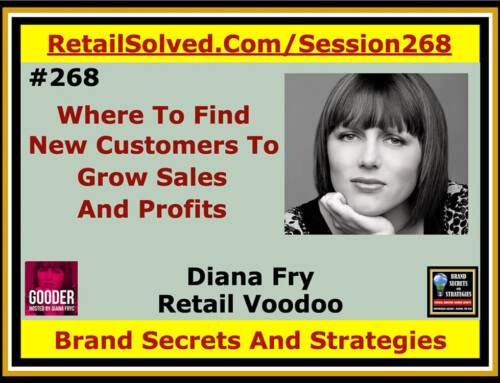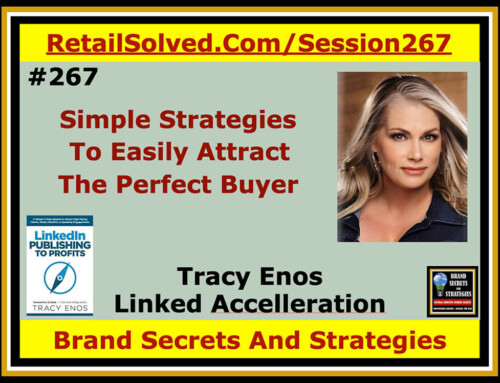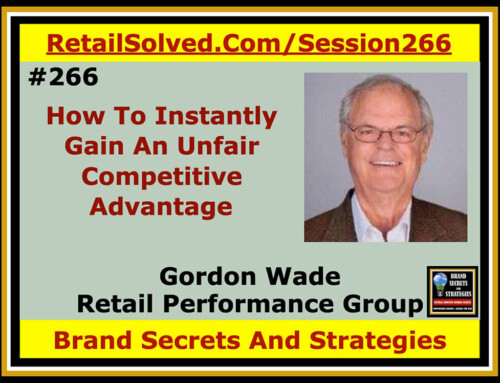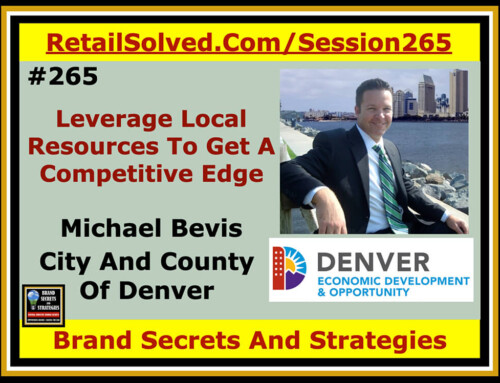I spend a lot of time talking about selling strategies, how to get your product on the shelf, and how to expand your distribution. About a year and a half ago, John Pagliaro reached out to me in response to an interview I had given. You'll meet him in a minute. He asked me if I'd like to be the keynote speaker at the Mexican Healthy Products Summit. I was honored, but I have to admit the idea of expanding your distribution into a foreign country was something I had never explored before. After doing a lot of research, I learned that there's a lot of opportunity outside of the United States, especially in Latin America.
The key trends I continually talk about on this show are actually more prevalent in Latin America and other countries. This, with a young health-conscious population, creates an ideal opportunity for health-conscious brands to grow into different markets, specifically Latin America. Not only are they hungry for American products, healthy American products, but they're some of the nicest people you'd ever want to deal with. There's an opportunity for a lot of young brands to take a leadership role in categories where they don't have to compete, necessarily, against the big brands. On top of that, the venue is absolutely amazing. There was a lot of opportunities to network outside of the sales floor, where brands could develop relationships with their retail partners. In fact, I'm still in contact with a lot of the people that I met at the show.
Natural product sales continue to grow in every country. Brands willing to consider alternative markets may find that they can quickly become the category leader in a less competitive environment. This also creates another opportunity to get your product into the hands of more committed shoppers.
Download the show notes below
Click here to learn more about the Mexican Healthy Products Summit
BRAND SECRETS AND STRATEGIES PODCAST #12 Hello and thank you for joining us today. This is the Brand Secrets and Strategies Podcast #12 Welcome to the Brand Secrets and Strategies podcast where the focus is on empowering brands and raising the bar. I’m your host Dan Lohman. This weekly show is dedicated to getting your brand on the shelf and keeping it there. Get ready to learn actionable insights and strategic solutions to grow your brand and save you valuable time and money. LETS ROLL UP OUR SLEEVES AND GET STARTED! Dan: Welcome. I spend a lot of time talking about selling strategies, how to get your product on the shelf, and how to expand your distribution. About a year and a half ago, John Pagliaro reached out to me in response to an interview I had given. You'll meet him in a minute. He asked me if I'd like to be the keynote speaker at the Mexican Healthy Products Summit. I was honored, but I have to admit the idea of expanding your distribution into a foreign country was something I had never explored before. After doing a lot of research, I learned that there's a lot of opportunity outside of the United States, especially in Latin America. The key trends I continually talk about on this show are actually more prevalent in Latin America and other countries. This, with a young health-conscious population, creates an ideal opportunity for health-conscious brands to grow into different markets, specifically Latin America. Not only are they hungry for American products, healthy American products, but they're some of the nicest people you'd ever want to deal with. There's an opportunity for a lot of young brands to take a leadership role in categories where they don't have to compete, necessarily, against the big brands. On top of that, the venue is absolutely amazing. There was a lot of opportunities to network outside of the sales floor, where brands could develop relationships with their retail partners. In fact, I'm still in contact with a lot of the people that I met at the show. I'm thrilled about the opportunity to introduce you to John and help you explore some alternative markets and some strategies to help grow your brand beyond your current reach. Welcome. Today I'd like to introduce you to John. We've been talking about the opportunity for brands, especially natural, organic brands, to broaden their reach and to get into markets where there isn't a lot of competition, and the demand for healthy products outside of the continental U.S. John, if you could tell us a little bit about yourself, your background, and how you got started in this path? John: Hi Daniel. Thanks for asking me to do this. My background was predominantly in media. In particular, the magazine business for about 25 years. I published various types of magazines, but at the end of my magazine tenure, I published a number of healthy lifestyle magazines. During that time through the magazine career, I always attended trade shows, a variety of different kinds of trade shows, and always had a love for them. I think that's what sort of pushed me into this business. Dan: Can you tell us a little bit about why trade shows? I mean, you said you've loved them. John: Right. Dan: But what was the opportunity, John, that you saw that you thought you could fill the void, if you will. The space that you thought you could fill in terms of the healthy products and needing another trade show. And then again, why Mexico? John: Right. Well, I've always loved trade shows. Back in the media business I think we went to a trade show every two or three months, and it was always a great opportunity to get to learn about a particular market sector and learn about it in a real detailed way because it's the only time where you can really get to talk to really anyone in the company that is there, whether it be the PR people, marketing, advertising people, or event he president. So it gives you an opportunity to really dig deep into a company, into a market, and in particular into the people that run the show. So we always felt, from a media standpoint, it was always a great opportunity to learn about either an advertiser that we wanted to get into the publication or a company that we wanted to write about editorially. So it served two different respects at that time. But in general, to me trade shows were fun, they were an educational experience, they opened my eyes to a market, I got to meet many people, but above and beyond that, Daniel, I think trade shows are a great way for people to get to know the future because many times at a trade show people are test marketing products. They'll have a product that they're displaying that may not be on the market now but they're ready to get it on the market in the next three to six months so they're getting feedback. So as I mentioned, it's just a great way to look into the future a bit. So I always loved trade shows, so five years ago, we used to travel to Mexico a lot. I had a friend who did some business in Mexico, and I asked him, "What's happening in Mexico as it relates to healthy products?" This was in 2012, and he didn't know, but he wanted to send some people out to the stores, which he did. In the meantime, I actually visited the Expo West show in Anaheim, our big natural products show in the States, and also did some research online. He came back to me and said, "John, there's not too much out there right now. There's some in the little stores, but not much in the supermarkets." And I said, "Okay, well that sounds like an opportunity." I started to do a little more research online and found out that things were slowly happening in Mexico. The government was really making the long term commitment to health education programs with the new food nutrition laws focusing on young children, and people were becoming more aware of health awareness, in general. So I went to Expo West and just asked people, "What do you think of Mexico? Do you want to do business in Mexico?" Many of them just said, "Yes. I love Mexico. How do I do it?" Since they were asking me that question, I felt as though there was a real need to develop something for them to connect with the right people and to do business in Mexico the right way. As we all know, Mexico is our neighbor. A very close business marketing partner for a lot of different categories, a lot of different big businesses, and I just felt it was the right time. That's how it got started, and since then it's been growing pretty well. Dan: I love how you said get to know the future. I think that's so appropriate. I love going to trade shows because basically the same thing. You get to try new things, to get to sample new and different things, and it's a great opportunity or venue for companies to show their wares and get feedback from their peers, something that all of us spread across the country don't really have an opportunity to, if you will, chime in on what's new. You talked about the new opportunities in terms of products and meeting a lot of companies. John, can you share, within all the trade shows, and not mentioning or picking any one by name, some of the tips and tricks that you've seen that brands have done, things that are done right, and things that need to be done better to help brands and retailers maximize the trade show experience? John: Right. Well I think it's very important because people want to get as much out of a trade show today as possible. I think we're all kind of ... We're in a different business mode. The internet has changed us. We want to get information fast and as much as possible. So I think as far as a trade show is concerned, you want to bring your best people, obviously. You want to bring people that are personable, people that are social. You want to bring people that are going to get the most out of the show. I think that's very, very important. And secondly, I think you've got to do your homework. You've got to know what you want to accomplish, who you want to meet, what retail sector you want to get into. Is your product right for that retailer? So I think doing homework, doing the preparation, getting to know the people beforehand, getting to know the retailers that are going to be there is very important. And I think, you know, the big shows are great. We all love big shows, and I've been to many of them. But I think the whole trade show industry is changing, too, and people want to get more done at a trade show. It's a huge investment. They're away from the family for three or four days. They're spending a lot of money. And we're seeing the trade show sector change, and it's changing. A lot of shows are much smaller, much more intimate like ours. You not only get to know the products, you not only get to know the packaging, you not only get to know the company and the market sector, but you get to know the people. And I think that's what sets our trade show from the rest is, people really get to know one another in our setting because we're there all weekend. We're there for three or four days. We're basically living together. We have time at the show. We have time at the conference, conference time, and we also have time during meals. We have social time. So it's a great way for you to dig deep and maybe ask questions you wouldn't normally ask in a business setting. Maybe sensitive questions. Maybe much more important questions, something you wouldn't think of, because the more time you spend with people the more you're going to think about, "Hey, what do I really need to know about this company and about how we can benefit from it?" Dan: I couldn't echo that more. In fact, I want to circle around back to that one of the things that I struggle with, and I've written a lot of articles about this, is that there are a lot of brands that show up to trade shows because they're told that's what you do without a clear objective. And as you've stated, and I think this is so critically important. The brands that are there for a purpose, that have a goal, that are ready to communicate, that know who they want to talk to, are the brands that succeed. So going back to what you're suggesting, what you're talking about, and I agree your show was amazing, the intimacy. Can you share some examples of maybe how something was more business was accomplished or how new relationships were opened up by focusing in on those intimate, if you will, opportunities? What I'm getting at is, we ate our meals together, we had presentations where we showed up together, there were different networking opportunities outside of the show itself. So what would you recommend a brand do, and again, can you point to an example or a way that a story that you could share with the audience are an example of how someone really maximized that opportunity? John: As I said before, I think first of all, it's a show. So you have to come prepared not just with the right people, but with the right booth setting and the right booth feel. It has to be an attractive setting. People are going to want to go into your booth. You want to make it easy for them to go into your booth, easy for them to talk to. People have been going to my show for a while, now for many different reasons. Some go to look for a distributor. Some go to increase their existing distribution in Mexico. Some of them go just to see if Mexico is a good opportunity for them. They'll go to many stores around Puerto Vallarta, where we have the show and check out what's in the stores. Is this opportunity for me? Does my product fit in Mexico? So they come to my show for different reasons. For instance, one manufacturer came to my show the first two years, and the first year he wanted to find a distributor and just didn't find it the first year. The second year he came, found a distributor, thought he was going to work with them, and it just didn't work out. The third year, he came again. This guy was relentless. That's another thing about Mexico. It's not easy. But if you have the persistence and the patience, that's what you need to get it done. His third year, he found a distributor, and they're working real well together. They're creating a huge brand in Mexico. That's another thing I would recommend to people. Maybe not just for Mexico, but emerging markets, in general. Emerging markets in general, I would think people would want to get into those now because it's incremental sales. You know, you want to get more sales, you want to develop an international brand, but many times it's not going to happen fast. You need patience and you need persistence. If you have that, it'll happen and it'll pay off in a big way. Dan: I like the stick-to-itiveness. I've met several brands over my career that have talked about developing their brand in Europe and Mexico, and especially Canada. That's always the easy place to launch a brand, if you will. I met several of the different retailers at your show. Some of the nicest people you could ever hope to work with. What I find is that they're sponges. They really want to learn about how we, in the States, do things. Not to copy us, but to add their own unique flavor. So going back to what you were saying about test the waters, I think that's so appropriate. Can you share with us some of barriers to entry? You were talking about how the stick-to-itiveness is what made that work for that particular brand. What are the success stories? And by the way, as a side note, one of the things that I really love about your show is that you bring the USDA and you bring in the Organic Trade Association, so you help make that initial path or conversations about as far as getting started in Mexico a lot easier than just showing up on the door and saying, "What do I do?" John: Right. Well, what we've done is focused on food and beverages, vitamins and supplements, beauty care, personal care products. Those are the three sectors that have really become very, very popular in Mexico over the past five years. We've had various success stories in those categories. You know, Mexico is 125 million people. They like to do what Americans do. They want to get healthier. People don't realize this, but over half of the country is 25 years of age and younger, so it's a growing market. It's a fast-growing middle class. People want to get healthier. We've had many success stories over the past five years, whether it's in food or personal care or household cleaning products. I can't name them all, but it's a gratifying experience to see products on the shelves because of your show. Our goal in starting this show was to get healthy products, more healthy products, on the shelves in Mexico. And I think we've accomplished that in a big way. Dan: You know, one of the things when you first reached out to me and said Mexico, you know, do you want to come down and participate, my first questions was, "Why Mexico? I mean, what's the opportunity?" I had really no idea what I would be getting into in terms of the market, the community, what the opportunities would be for brands in terms of how do I structure my talk around them? John: Right. Dan: And what I shared with your audience, again thank you, was that the Latin American opportunity for natural organic product growth, their desire to have healthier products to choose from, is far greater than it is here in the US. So the opportunity, therefore, is much greater. Then while at the show, I spoke with several different distributors, brokers, et cetera from other countries. Columbia, whatnot, that they too, were very hungry for healthy products. In fact, I mentioned before we started this show today that I was just speaking to a Columbia-based company. A guy actually moved from Colorado to Columbia because the opportunity there was so great for natural organic products. Is there anything else you want to share about that need? Again, the fact that the population is pretty young, that they're very interested and committed to healthy products, what else can you share? John: Well, Mexico, as the natural food market in Mexico has been growing 42% to 45% annually, which is huge. We're really seeing the beginning of the growth in Mexico. And although the market, in general, is still small compared to the United States, the potential for US exporters is great. I mean, you're seeing great American brands like Bob's Red Mill and Nature's Path just taking off in Mexico, now. And those are just two big brands that, you know, they got in earlier. They got in maybe four or five years ago, but they've grown really, really fast. It's just over the past five years. I think it's just been these past five years, Daniel, that there's just been an increasing awareness of healthy products. Not only to lose weight, but to also minimize the threat of diabetes and people that have allergies. These trends they sort of adopted from abroad. For example, a lot of the brands that Mexicans become familiar with are because they discovered them while traveling to the States or other countries. That's what's driving this market. Mexico has few domestic companies that manufacture or specialize in making these kind of products, so they turn to the US and other countries to introduce these new, healthy products to the market. The thing about Mexico is, Mexicans already have a general awareness of the US lifestyle through such avenues as entertainment and travel and in large part, the Hispanic population in the United States. Our two countries, we're neighbors. We're almost closer than that, we're like roommates because we're very close and people move back and forth over the boarders all the time. And that's a great learning experience. That's what really turned me on to Mexico was just the closeness that we have and what's happening in the market as it relates to the healthy products movement and what the government's doing, what the people want, and the opportunity it really has for the US exporters. Dan: I've been working with that segment of the population throughout my entire career, and what I find is that they're extremely loyal. More loyal than perhaps any ethnic group out there. At least that's what my findings have been. More importantly, they've got a deep, rich culture. And they bring that deep, rich culture wherever they go, which I really appreciate. They're very family-focused. When you combine that with the numbers you shared with us, 42%, I think in this country our natural's up 12%, so we're talking night and day difference. The opportunity for a young brand to become the leader on the shelf without the tremendous amount of competition that we have here, I think there's a lot of opportunity. In terms of the barriers to entry to enter Mexico as a product, what steps would you recommend? What steps do you see that a brand should take to be successful? John: Well that's a good question, Daniel, because there are barriers. In any country there are barriers, but in Mexico I think it sometimes gets difficult. They're very protective about the importation of natural foods and supplements. Mainly for sanitary purposes. The past few years, some companies have offered miracle products promising weight loss, and they just don't live up to those standards. So they've been very strict. These products don't have all the completed nutritional facts, so you have to be very careful with your nutritional facts. So you have to be very careful with your labeling and your ingredients, and they might not even match the Mexican diet. So you have to be aware of what Mexicans want. The authorities are very careful about which products get into the market, especially in regards to vitamins and supplements. Many products could be stopped at the border without the right regulations or certifications, so you have to be on top of your game, here. I think the key, and that's why we started the show, is to partner with the right people. So at our show, we not only have quality US manufacturers, but we invite quality Mexican retailers and quality Mexican distributors because the retailers and the distributors are going to help you move the product over. That's the important connection that we make at our show. I always say to people, you know, it's not difficult to export to Mexico. If you can make the products, you can export to Mexico, but you have to partner with the right people because the partners make the whole process much easier for you in the end. But if you have the capability of making products, you can get into Mexico. Dan: Makes good sense. I want to reiterate that again. The people that I worked with ... I'm sorry, the people that I spoke with at your show were there for the right reasons. They wanted, genuinely wanted to make an impact in the community by bringing the healthy products. And again, the retailers, the Mexican retailers were extremely friendly and open armed in terms of embracing what we had to offer. One of the things that was announced at your show was that the USDA Organic Trade Association here in the States announced that the USDA equivalent for Mexico had just been certified. And this was announced during your show, literally realtime. So going back to some of the quality of the products and how authentic they need to be, I think that's key. Is there anything else that you can share, that you'd like to share in terms of strategies, tips, and tricks that brands might want to capitalize on or might want to look toward to be successful in Mexico? John: Yeah, I think first of all, I started the show because I feel the market is there. I know many US companies think Canada first, and that's fine, but I think if you want to think of a second country, think of Mexico. Given the proximity, the huge market there, the large young population, the real need for healthy products, the government promoting a much healthier lifestyle, and the cooperation that there is amongst quality retailers and quality distributors can make a successful partnership for anyone interested in entering an emerging market. I go into the stores now when I get down there every month, and I see more and more smaller organic shops opening up. I see more pharmacies carrying healthy products. I see more large department stores carrying healthy products. I see convenience stores now starting to carry healthy products. And what we see in Mexico now, and it even happened faster than it happened in the United States, we're seeing more healthy products in the big supermarkets. They're now developing their own natural organic sections in the supermarkets. That took a while to happen in the United States, but in Mexico it's happened within the last two or three years. So people ask me, "Well how's the market in Mexico, John?" I said, "Well, it's growing faster than I thought it would. It's really taking off and it's fun to see. And we just want to help it keep growing." Dan: I've got to admit, when going on some store tours when I was down there, actually a couple of times I went down there last year, you see a lot of really great movement in terms of stores developing a natural organic section and actually integrating the sets, as we talked about at the show, which is so important. One thing I wanted to reiterate you mentioned this to me, and I saw this firsthand, not only at your show but my son's wedding, is that Mexico also equals Latin America. What that means is that the Mexican, obviously those companies, those retailers are there, brokers and distributors and whatnot, but you also saw a pretty strong presence from Columbia, Brazil, and some of the other many countries in the Latin American economy. Can you speak to that? John: Well, we're looking at that very closely, Daniel. I think Latin America, you know Central America in particular, and some of the South American countries, are growing. Maybe not as fast as Mexico, because they're sort of farther away from the US and maybe they don't have the closer ties because of proximity, but it's another emerging market. I think US exporters should take a close look at countries like Costa Rica and Panama and Peru and Columbia and Ecuador. I think those kinds of countries are in the game already. Keep in mind, and one thing I forgot to mention is, these countries like Mexico and the ones I've mentioned, they know the organic movement. They make many, many organic products in their country. Mexico is one of the largest organic exporters in the world. Many things that we eat in Mexico from lettuce, to tomatoes, to avocado all come from Mexico. So they know the game pretty well, but they don't have a lot of the package goods products that we have in the States, so they're always looking towards that as an opportunity to place on their shelves. But as far as Latin America, growing, emerging market that I think the US exporters should take a very close look at. Dan: That's a key point, and again to reiterate that, a lot of the products, the produce that we see as coming out of Mexico. They farm organically because they don't have all the chemicals, so I think that's a key point. I'm glad you mentioned that because a lot of people really don't make that connection. One of the other concerns that I had when we first spoke when you first asked me to do this was, I don't speak Spanish. So how much of a problem is that for you? Because I know you don't speak Spanish, either. John: I don't speak much Spanish, either. And I'm trying. I'm trying. I'm learning a little, a little. You know one of the great things about this business and developing this show is, I've just developed great relationships. And without them I couldn't do this. I have great partners, great friends, great relationships in Mexico that help me. And the good thing about it is that most of the people in the healthy products business, whether at the retail or the supply level speak English, so it hasn't been a problem. And it's never been a problem at our show, either. However, we do have translators at our show that walk the show if anyone wants a translator all day, they can have one. Of course it would be much better and an advantage to speak the language. It's a much better way to communicate and show respect, but you know, the show gets along just quite well without everyone speaking Spanish. We do have speakers, if they speak Spanish better than English, we say go right ahead and we have the translation equipment that helps everyone. So it hasn't been an issue. It hasn't been an issue for me when I go to Mexico. I love going to Mexico, and hopefully one day I will learn Spanish, Daniel. Dan: I'm working on it, myself. I would love to be able to honor their community by being able to speak their language and understand them a lot better. One of the points that you mentioned, and I really want to reiterate this. A lot of times I go to a show, and I'm just a number, just a badge, if you will. Whereas when I went to your show, I was a person. That's what I saw. You were talking about that a minute ago. The close connection. The fact that it's not just, "Here, buy my stuff," it's, "Let me know a little bit more about you." The reason why I bring that up is because in this country, we've gotten away from the relationship selling, and that's where natural organic products excel the most. The relationship selling. It's about developing a relationship. You you've talked about this a couple times earlier in the conversation, where brands, distributors, retailers, et cetera develop a strong relationship, and that's what helps them succeed in the country. Any other comments you want to make along those lines? John: Yeah, you're so right there, Daniel. I like to tell people that attend my show, "Hey, for 362 days, this was my show. For these three days that we're here at this show, it is now your show." That is so true because it's just a great opportunity for them to reestablish old relationships, build new ones, get to know Americans, Americans getting to know Mexicans, suppliers getting to know distributors, suppliers getting to know retailers. The networking opportunities at a show like ours, which is a hosted buyer model, is just outstanding. Many of our exhibitors and retailers have said the same thing. You develop business relationships, but you also develop friends with business relationships. And I think that's what it's all about. It's just much better to communicate with people after the show than it was before, because you've developed a different rapport with them. You've gotten to know them, and I think that's the big difference between the smaller, kind of intimate show versus the larger show settings today. Dan: I've got to admit, I come away from some of the bigger shows that we've made reference to, and I'll have several hundred business cards, people I've talked to. And I'll reach back out to them, even some people say, "Contact me afterwards." And there are crickets or it's silence, and you have to work so hard to get in front of them. I came out away from your show with just a handful of business cards. When I go to other shows and bump into those people again, it's as though our conversation never stopped. It's as though we are friends. And I still swap emails with several of them. What a great atmosphere. And again, this is where natural organic products, authentic, transparent products excel and succeed. So again, John, thank you so much for your time. John: Thank you. Dan: Anything else you would like to share with us? John: I think that's about it. I think, you know, as I said before, Mexico is a great opportunity for the natural products market. If you have any questions, let us know. We'd love to see you in Puerto Vallarta in January. Dan: And it's such a nice venue. Man, we spent a lot of time going back and looking at some of the amazing photographs we took. The sunsets. And I know that's beyond the scope of this podcast, but the music, the culture. It was just a phenomenal experience, and again, thank you for that opportunity, and I look forward to hopefully helping you get more exhibitors and more contacts down in Mexico and help broaden your base because I think you've got something that's very genuine, very real, and very necessary in terms of growing our industry. So thanks, again. John: Thank you very much, Daniel. I appreciate the opportunity. Dan: I'd like to thank John again for coming on the show today. I hope you learned a lot about alternative markets, along with the opportunity to creatively grow your brand in emerging markets. If you'd like to learn more about the Mexican Healthy Product Summit, it's healthyproductssummit.com. I'll put a link to it in the show notes and on my website. To help you make the most out of this trade show and every other trade show you attend, I'm going to include today my retail math cheat sheet. It has all the key formulas you need to be successful. You can either text “RETAILMATH” to 44222, or download it with the show notes on my website at BRANDSECRETSANDSTRATEGIES.com/session12. This episode's FREE downloadable guide Each of us needs to perform basic retail math calculations but it's not always possible to remember every formula, especially if you don't use them on a regular basis. Here's a quick cheat sheet with some of the most important formulas you need to know. CLICK HERE TO DOWNLOAD YOUR FREE STRATEGIC GUIDE: Retail Math Cheat Sheet Thanks again for joining us today. Make sure to stop over at brandsecretsandstrategies.com for the show notes along with more great brand building articles and resources. Please subscribe to the podcast, leave a review, and recommend it to your friends and colleagues. Sign up today on my website so you don’t miss out on actionable insights and strategic solutions to grow your brand and save you valuable time and money. I appreciate all the positive feedback. Keep your suggestions coming. Until next time, this is Dan Lohman with Brand Secrets and Strategies where the focus is on empowering brands and raising the bar. Enter your name and email address below and I'll send you periodic updates about the podcast. Sign up to receive email updates
Listen where you get your podcast
Like what you’ve heard? Please leave a review on iTunes
FREE Trade Promotion ROI Calculator:
Click Here To Maximize Sales And Profits
Free brand-building resources to help you grow and scale
Turnkey Sales Story Strategies FREE ON-DEMAND COURSE
Why Most Brands Fail – The Roadmap To Sales Success FREE ON-DEMAND COURSE
Essential In-Store Customers First Marketing Strategies FREE ON-DEMAND COURSE
How To Drive Profits With Sustainable Packaging FREE ON-DEMAND COURSE
The Retail Game – What You Need To Know With Bob Burke FREE ON-DEMAND COURSE
Sales Success Begins With A Solid Business Plan FREE ON-DEMAND COURSE
How To Turn Your OnLine Data Into Explosive Sales Growth FREE ON-DEMAND COURSE
2016 Category Management Handbook Page 20 & 21
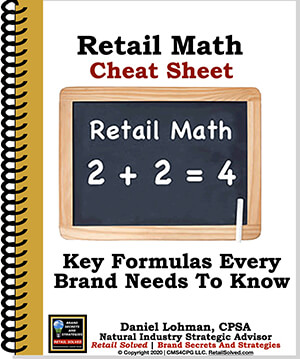
Want A Retail Math Cheat Sheet?
Each of us needs to perform basic retail math calculations but it’s not always possible to remember every formula, especially if you don’t use them on a regular basis. Here’s a quick cheat sheet with some of the most important formulas you need to know.
Empowering Brands | Raising The Bar
Ever wish you just had a roadmap? Well, now you do!
Don’t miss out on all of these FREE RESOURCES (strategic downloadable guides, podcast episodes, list of questions you need to be asking, and know the answers to, the weekly newsletter, articles, and tips of the week. You will also receive access to quick and easy online courses that teach you how to get your brand on the shelf, expand distribution, understand what retailers REALLY want, and address your most pressing challenges and questions.
All tools that you can use, AT NO CHARGE TO YOU, to save you valuable time and money and grow your sales today!
Image is the property of CMS4CPG LLC, distribution or reproduction is expressively prohibited.
